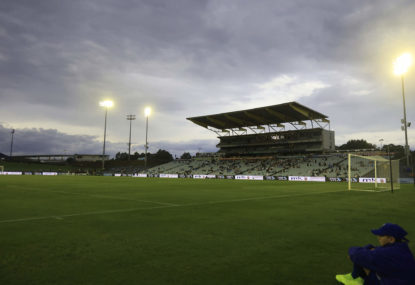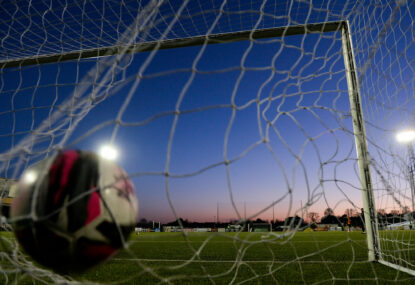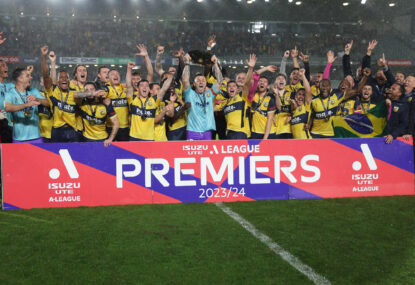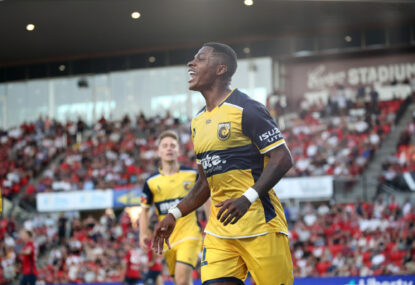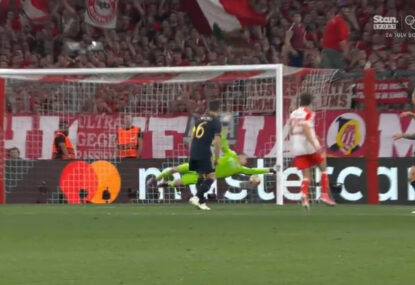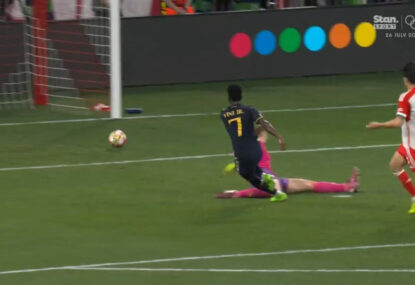Another scintillating week has passed in the A-League, with Australian football etching its way into the Australian sporting record books.
The Brisbane Roar’s remarkable run of undefeated games has gained worldwide exposure, and adds another tale to the short, but commendable history throughout Australia’s elite football competition.
While only nine points separates second from last on the table, the A-League is certainly heating up, as we enter the summer period of the competition.
Brisbane Roar riding on cloud nine:
We may repeat ourselves on a frequent basis; however this Brisbane Roar outfit is certainly one to be admired. Unless you’ve been sleeping under a rock for the past week, or simply couldn’t care less about football, Brisbane Roar have surpassed Easter Suburbs’ (now Sydney Roosters) long-standing 74-year-old record for the most consecutive unbeaten games in top flight Australian sport – the rugby league club’s incredible streak of 35 games was create from 1936-37.
Brisbane’s demolition of Perth Glory last weekend, where it put four past the visitors in the opening period, ensured that Ange Postecoglou’s men would eradicate the former record, and rewrite the history books, in spectacular fashion.
Undefeated for a 36-game period is truly a remarkable feat in any sport, regardless of the inequality in budgets between the powerhouse clubs, and the cellar-dwellers. Conversely, when considering the various constraints Brisbane has had to work under – a limited budget amid the salary cap, reduced squad sizes and exempt of marquee signings – their accomplishment is rather exceptional.
Unlike many competitions around the globe, the Roar didn’t encompass advantages from a fiscal perspective to facilitate their status within Australian football.
Records akin to Arsenal’s 49-game unbeaten streak will forever be a memory within football folklore, although when we consider the differing environments it was set, in contrast to Brisbane’s, then the Australian team’s is a superior record in that regard.
Recently, in some quarters of the football community, Brisbane have been dubbed as “Roarcelona” – a palpable comparison with Spanish champions Barcelona and its style of play. The football implemented under Postecoglou has helped raise the standard of Australian football, and importantly strive for greater heights within the domestic game. The ethos adopted has been a delight to witness, and undoubtedly is raising the tactical awareness around the competition.
The Roar’s execution of football has justly been a breath of fresh air for the A-League, however one question still remains – when will this glittering undefeated streak be brought to an end?
Have Melbourne Victory turned the corner?
A chaotic week of off-field drama for Australia’s biggest football club saw Director of Football Francis Awaritefe shown his marching orders, a precarious future hanging over the head of coach Mehmet Durakovic – seemingly forced to front the media to reiterate who’s in charge of the team, following reports suggesting the team was talking orders from assistant Kevin Muscat – and the untimely gossip surrounding Harry Kewell’s apparent plans to bring in former Argentinean international Abel Balbo as his personal advisor and trainer.
Nonetheless, all appeared to have been forgotten, when the Victorian based outfit was graced with a Carlos Hernandez winner against Gold Coast United, to record its second win of the season.
Victory played a fluid brand of football, linking beautifully between defence and attack, which saw the team lead 2-0 during the opening half. It was a sight, rarely, if ever seen while under Durakovic in the A-League – possibly with exception to the opening round Sydney FC blockbuster.
There appeared to be cohesion within the playing group, looking dangerous when venturing forward, with a purpose and hunger – constituents which were far from apparent in the dour week seven draw with Perth Glory, which saw Melbourne yield a two-goal cushion against 10 men to ultimately share the points.
Roddy Vargas’ expulsion during the first half – a crude challenge on Golgol Mebrahtu – did swing momentum away from the host’s, consequently surrendering its two-goal buffer. However, Victory exemplified poise, heart and an array of fighting spirit to eventually seal the three points, and importantly its first home win of the season, following four consecutive draws in the Victorian capital.
Have Victory relinquished their calamitous beginning to the campaign? It would be a little premature at this point; overcoming a team placed at the foot of the table won’t win over pundits. On the contrary, if last week was an indication of a collective unit gelling coherently, then Melbourne are certainly heading in the right direction.
Victory has an arduous schedule in the next week, and if it can conquer the rigours that accompanies it, then we may well see a renaissance in this star-studded line-up. An away trip to the Hunter Valley will see Melbourne take on the Newcastle Jets, with Adelaide United waiting Saturday week at home. Squashed in between the two A-League meeting is the glamour friendly with David Beckham’s LA Galaxy on Tuesday night at Etihad Stadium.
Whilst alarm bells were ringing throughout the embattled club last week, it’s rather humorous that the club occupies third position on the table – its only loss, courtesy of a 1-0 defeat to Adelaide United in round two. It is not all doom and gloom for Victory, although its legion of top-flight stars must take the initiative, and make amends for their tenuous start to the season. It all begins against the Novocastrians.
Refereeing blunders dominate the headlines, yet again:
Gerard Parsons was at the centre of controversy for Melbourne Heart’s away trip to face the Central Coast Mariners. The referee’s noticeable blunders paved the way for the home side to cement the bragging rights, and condemn a luckless Heart to another result influenced by the officials.
Matt Simon’s opener on the cusp of half time was fortunate to stand on two fronts. The corner, which lead to the goal, should have been awarded a goal-kick – with replays evidently showing no deflection – while Parsons failed to award a foul on Simon at the subsequent set-play, who obstructed custodian Clint Bolton, before the forward hit his clinical strike to give the Mariners an undeserved lead.
If the earlier incidents weren’t enough, drama struck once more. After clawing their way back into the tie through an Eli Babalj header, Parson’s sensationally awarded Central Coast a spot kick late in the game, deeming Heart’s Argentinean midfielder Jonatan Germano to use his hand inside the penalty area to control the ball.
The decision was rather embarrassing, considering Parson was positioned perfectly, and yet got the verdict awfully wrong – replays revealed the ball clearly hit the shoulder of Germano.
Consequently, the spot kick proved to be the catalyst for a 3-1 Mainers victory. Refereeing is a difficult assignment, and while many fans understand this, mediocrity of this magnitude shouldn’t be accepted in the Australia’s premier football competition.
What is the correct formula to improve refereeing standards? There’s no easy answer. Many fans have called for referees to become full-time, although with Football Federation Australia’s limited budget, this perhaps won’t come into fruition for a while yet. As discussed on Fox Sports FC, having the officials go out to clubs and undertake some form of training could be an idea for long-term success.
The FFA have been pro-active, appointing Mark Shield as director of refereeing, however it hasn’t transitioned into a superior performance of officiating thus far. Hopefully we see more consistency amongst refereeing, as it is an integral element of the game’s growth.
Courtesy of Goal Weekly – Follow Robbie on Twitter @RobertDiFabio





























































































